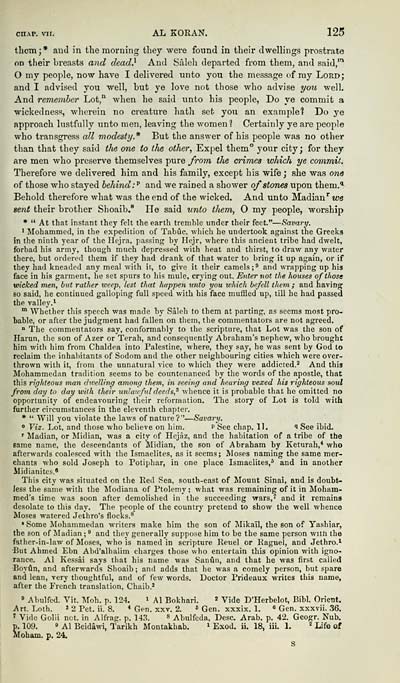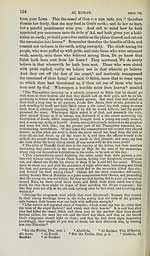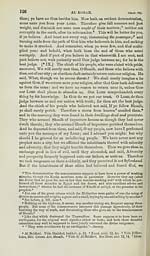Download files
Complete book:
Individual page:
Thumbnail gallery: Grid view | List view

cnAP. VII. AL KORAN. 125
tbcTnj* auJ in the morning they wei-e found in their dwellings prostrate
on their breasts and dead} And Saleh departed from them, and said,"^
O my peojile, now have I delivered unto you the message of my Lord;
and I advised you well, but ye love not those who advise you well.
And remember Lot,° when he said unto his people, Do ye commit a
wickedness, wherein no creature hath set you an example? Do 3'-e
approach lustfully unto men, leaving the women? Certainly ye are people
who transgress all modesty* But the answer of his people was no other
than that they said the one to the other, Expel them" your city; for they
are men who preserve themselves pure from the crimes which ye commit.
Therefore we delivered him and his family, except his wife ; she was one
of those who stayed behind:^ and we rained a shower of atones upon them.*
Behold therefore what was the end of the wicked. And unto Madian'' we
sent their brother Slioaib.* He said unto them, O my people, worship
* " At that instant they felt the earth tremble under their feet." — Savary.
' Mohammed, in the expedition of Tabuc. wliich he undertook against the Greeks
in the ninth year of the Hejra, passing by Hejr, where this ancient tribe had dwelt,
forbad his army, though much depressed with heat and thirst, to draw any water
there, but ordered them if they had drank of that water to bring it up again, or if
they had kneaded any meal with it, to give it their camels ;9 and wrapping up his
face in his garment, lie set spurs to his mule, crying out. Enternot the houses of those
wicked men, but rather weep, lest that happen nnto you which be/ell them ; and having
so said, he continued galloping full speed with his face muffled up, till he had passed
the valley.^
™ Whether this speech was made by Saleh to them at parting, as seems most pro-
bable, or after the judgment had fallen on them, the commentators are not agreed.
° The commentators say, conformably to the scripture, that Lot was the son of
Harun, the son of Azer or Terah, and consequently Abraham's nephew, who brought
him with him from Chaldea into Palestine, where, they say, he was sent by God to
reclaim the inhabitants of Sodom and the other neighbouring cities which were over-
thrown with it, fiom the unnatural vice to which they were addicted.* And this
Mohammedan tradition seems to be countenanced by the words of the apostle, that
this righteous man divelUng among them, in seeing and hearing vexed his righteous soul
from day to day with their unlairful deeds,^ whence it is probable that ho omitted no
opportunity of endeavouring their reformation. The story of Lot is told with
further circumstances in the eleventh chapter.
* " Will you violate the laws of nature?" — Savary.
» Viz. Lot, and those who believe on him. p See chap. 11. i See ibid.
' Madian, or Midian, was a city of Hejaz, and the habitation of a tribe of the
same name, the descendants of Midian, the son of Abraham by Keturah,* who
afterwards coalesced with the Ismaelites, as it seems; Moses naming the same mer-
chants who sold Joseph to Potiphar, in one place Ismaelites,* and in another
Midianites."
This city was situated on the Red Sea, south-east of Mount Sinai, and is doubt-
Jess the same with the lilodiana of Ptolemy ; what was remaining of it in Moham-
med's time was soon after demolished in the succeeding wars,^ and it remains
desolate to this day. The people of the country pretend to show the well whence
Moses watered Jethro's flocks.*
* Some Mohammedan writers make him the son of Mikail, the son of Yashiar,
the son of Madian ; * and they generally suppose him to be the same person with the
father-in-law of Moses, who is named in scripture Reuel or Raguel, and Jethro.^
■But Ahmed Ebn Abd'alhalim charges those who entertain this opinion with igno-
rance. Al Kessai says that his name was Sanun, and that he was first called
■Boyfln, and afterwards Shoaib; and adds that he was a comely person, but spare
and lean, very thoughtful, and of few words. Doctor Prideaux writes this name,
after the French translation, Chaib.'
9 Abulfed. Vit. Moh. p. 124. i Al Bokhari. » Vide D'Herbelot, Bibl. Orient.
Art. Loth. » 2 Pet. ii. 8. * Gen. xxv. 2. « Gen. xxxix. 1. « Gen. xxxvii. 36.
^ Vide Golii not. in Alfrag. p. 143. « Abulfeda, Desc. Arab. p. 42. Geogr. Nub.
^109. » Al Beidawi, Tarikh Montakhab. ^ Exod. ii. 18, iii. 1. * Life of
oham. p. 24.
tbcTnj* auJ in the morning they wei-e found in their dwellings prostrate
on their breasts and dead} And Saleh departed from them, and said,"^
O my peojile, now have I delivered unto you the message of my Lord;
and I advised you well, but ye love not those who advise you well.
And remember Lot,° when he said unto his people, Do ye commit a
wickedness, wherein no creature hath set you an example? Do 3'-e
approach lustfully unto men, leaving the women? Certainly ye are people
who transgress all modesty* But the answer of his people was no other
than that they said the one to the other, Expel them" your city; for they
are men who preserve themselves pure from the crimes which ye commit.
Therefore we delivered him and his family, except his wife ; she was one
of those who stayed behind:^ and we rained a shower of atones upon them.*
Behold therefore what was the end of the wicked. And unto Madian'' we
sent their brother Slioaib.* He said unto them, O my people, worship
* " At that instant they felt the earth tremble under their feet." — Savary.
' Mohammed, in the expedition of Tabuc. wliich he undertook against the Greeks
in the ninth year of the Hejra, passing by Hejr, where this ancient tribe had dwelt,
forbad his army, though much depressed with heat and thirst, to draw any water
there, but ordered them if they had drank of that water to bring it up again, or if
they had kneaded any meal with it, to give it their camels ;9 and wrapping up his
face in his garment, lie set spurs to his mule, crying out. Enternot the houses of those
wicked men, but rather weep, lest that happen nnto you which be/ell them ; and having
so said, he continued galloping full speed with his face muffled up, till he had passed
the valley.^
™ Whether this speech was made by Saleh to them at parting, as seems most pro-
bable, or after the judgment had fallen on them, the commentators are not agreed.
° The commentators say, conformably to the scripture, that Lot was the son of
Harun, the son of Azer or Terah, and consequently Abraham's nephew, who brought
him with him from Chaldea into Palestine, where, they say, he was sent by God to
reclaim the inhabitants of Sodom and the other neighbouring cities which were over-
thrown with it, fiom the unnatural vice to which they were addicted.* And this
Mohammedan tradition seems to be countenanced by the words of the apostle, that
this righteous man divelUng among them, in seeing and hearing vexed his righteous soul
from day to day with their unlairful deeds,^ whence it is probable that ho omitted no
opportunity of endeavouring their reformation. The story of Lot is told with
further circumstances in the eleventh chapter.
* " Will you violate the laws of nature?" — Savary.
» Viz. Lot, and those who believe on him. p See chap. 11. i See ibid.
' Madian, or Midian, was a city of Hejaz, and the habitation of a tribe of the
same name, the descendants of Midian, the son of Abraham by Keturah,* who
afterwards coalesced with the Ismaelites, as it seems; Moses naming the same mer-
chants who sold Joseph to Potiphar, in one place Ismaelites,* and in another
Midianites."
This city was situated on the Red Sea, south-east of Mount Sinai, and is doubt-
Jess the same with the lilodiana of Ptolemy ; what was remaining of it in Moham-
med's time was soon after demolished in the succeeding wars,^ and it remains
desolate to this day. The people of the country pretend to show the well whence
Moses watered Jethro's flocks.*
* Some Mohammedan writers make him the son of Mikail, the son of Yashiar,
the son of Madian ; * and they generally suppose him to be the same person with the
father-in-law of Moses, who is named in scripture Reuel or Raguel, and Jethro.^
■But Ahmed Ebn Abd'alhalim charges those who entertain this opinion with igno-
rance. Al Kessai says that his name was Sanun, and that he was first called
■Boyfln, and afterwards Shoaib; and adds that he was a comely person, but spare
and lean, very thoughtful, and of few words. Doctor Prideaux writes this name,
after the French translation, Chaib.'
9 Abulfed. Vit. Moh. p. 124. i Al Bokhari. » Vide D'Herbelot, Bibl. Orient.
Art. Loth. » 2 Pet. ii. 8. * Gen. xxv. 2. « Gen. xxxix. 1. « Gen. xxxvii. 36.
^ Vide Golii not. in Alfrag. p. 143. « Abulfeda, Desc. Arab. p. 42. Geogr. Nub.
^109. » Al Beidawi, Tarikh Montakhab. ^ Exod. ii. 18, iii. 1. * Life of
oham. p. 24.
Set display mode to: Large image | Transcription
Images and transcriptions on this page, including medium image downloads, may be used under the Creative Commons Attribution 4.0 International Licence unless otherwise stated. ![]()
| Early Gaelic Book Collections > J. F. Campbell Collection > Koran: or, Alcoran of Mohammed > (279) |
|---|
| Permanent URL | https://digital.nls.uk/77137164 |
|---|
| Description | Volumes from a collection of 610 books rich in Highland folklore, Ossianic literature and other Celtic subjects. Many of the books annotated by John Francis Campbell of Islay, who assembled the collection. |
|---|
| Description | Selected items from five 'Special and Named Printed Collections'. Includes books in Gaelic and other Celtic languages, works about the Gaels, their languages, literature, culture and history. |
|---|

